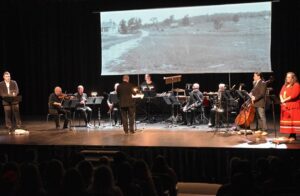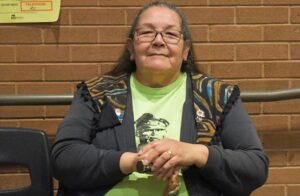Francis Pegahmagabow brought to life on stage for next generation

By Kelly Anne Smith
NORTH BAY — Fascinated, wide-eyed students filled the West Ferris Secondary School auditorium March 22, watching and listening to the language, words and stories of Francis Pegahmagabow, the most decorated First Nations soldier in Canadian military history.
Over 1,400 Near North District School Board students from across the district attended Sounding Thunder: The Song of Francis Pegahmagabow over three days. Live orchestral music by professional musicians with dramatic storytelling and traditional singing with historical photographs brings Pegahmagabow’s history to life.
The Festival of the Sound libretto, written by Armand Garnet Ruffo, was inspired by the book, Sounding Thunder: The Stories of Francis Pegahmagebow, by Dr. Brian D. McInnes. McInnes is the narrator in the production and a great-grandson of Pegahmagabow. McInnes has said that Francis Pegahmagabow’s heroism is also in his contributions to his community, family, and early Indigenous political movements. Pegahmagabow was from the Caribou clan, born in Shawanaga First Nation and lived in Wasauksing First Nation.
Born in 1889, Pegahmagabow enlisted in August 1914, with the Northern Pioneers/the 23rd Regiment. Corporal Francis Pegahmagabow was the deadliest sniper and scout of the First World War, credited with 378 kills and 300 captures. His medal set includes the Military Medal with two bars, the 1914-1915 Star, the British War Medal 1914-1920, and the Victory Medal 1914-1919.
A superfan of the production, Francis’ granddaughter Laura Pegahmagabow was at the performance. She shares about the family donating her Grandpa’s medals to the Canadian War Museum.
“She (Auntie Marie Anderson) decided to put his medals in the war museum in Ottawa. She asked what we wanted. I said, ‘That would be a good idea Auntie, then everybody could see them’. The following year, the army invited us to Ottawa. They put us all up on one floor of a hotel. Well, that was the Pegahmagabow floor when we donated the medals.”

In the performance, the audience hears the narrator saying that after the war, back in Canada, Francis Pegahmagabow the war hero was not treated as an equal as he was on the battlefield. The Soldier Settlement Act provided WWI veterans with loans to purchase land, stock, and equipment, but when Francis applied, he was turned down.
“The Indian agent scoffs and scorns and won’t support Francis at his location. He tells the government he is too much of a risk, too temperamental.”
Pegahmagabow was a life-long warrior, protesting curtailed Treaty rights, and opposing the Indian Act. He was Chief and Councillor of Parry Island First Nation (now Wasauksing First Nation), and later became the Supreme Chief of the National Indian Government, an early First Nations organization.
Grade 12 West Ferris Secondary School student Bryce Millard thought Sounding Thunder was amazing. He asked the main character played by Keenan Keeshig, from Neyaashiinigmiing Reserve No. 27, how it felt to put himself into the role of Francis Pegahmagabow.
“It’s been amazing. I grew up in Shawanaga where Francis grew up… Learning how to fish and hunt with my uncles. Coincidentally, that’s where he learned. I used to play hockey there as well. I’ve been training and running down, what we call, the Landing Road towards Georgian Bay. It’s probably the same road that Francis used to train on for the war. I’ve always heard legendary stories about him all the time growing up, especially in Shawanaga.”
Millard was surprised with the history of Pegahmagabow’s life, previously not knowing much about him.
“There were a lot of interesting parts in it. I liked how soothing the music was a lot of the time, too. It really helped to drive different parts of the story because there were parts that were super intense and then there were parts that were super lax that would make you sink in your seat,” Millard explains. “To learn about Francis was a very cool experience. To get to see something like this is a great opportunity.”
He adds he is Indigenous but has never taken the time to explore that side of his life.
“It makes me want to dive into it.”


